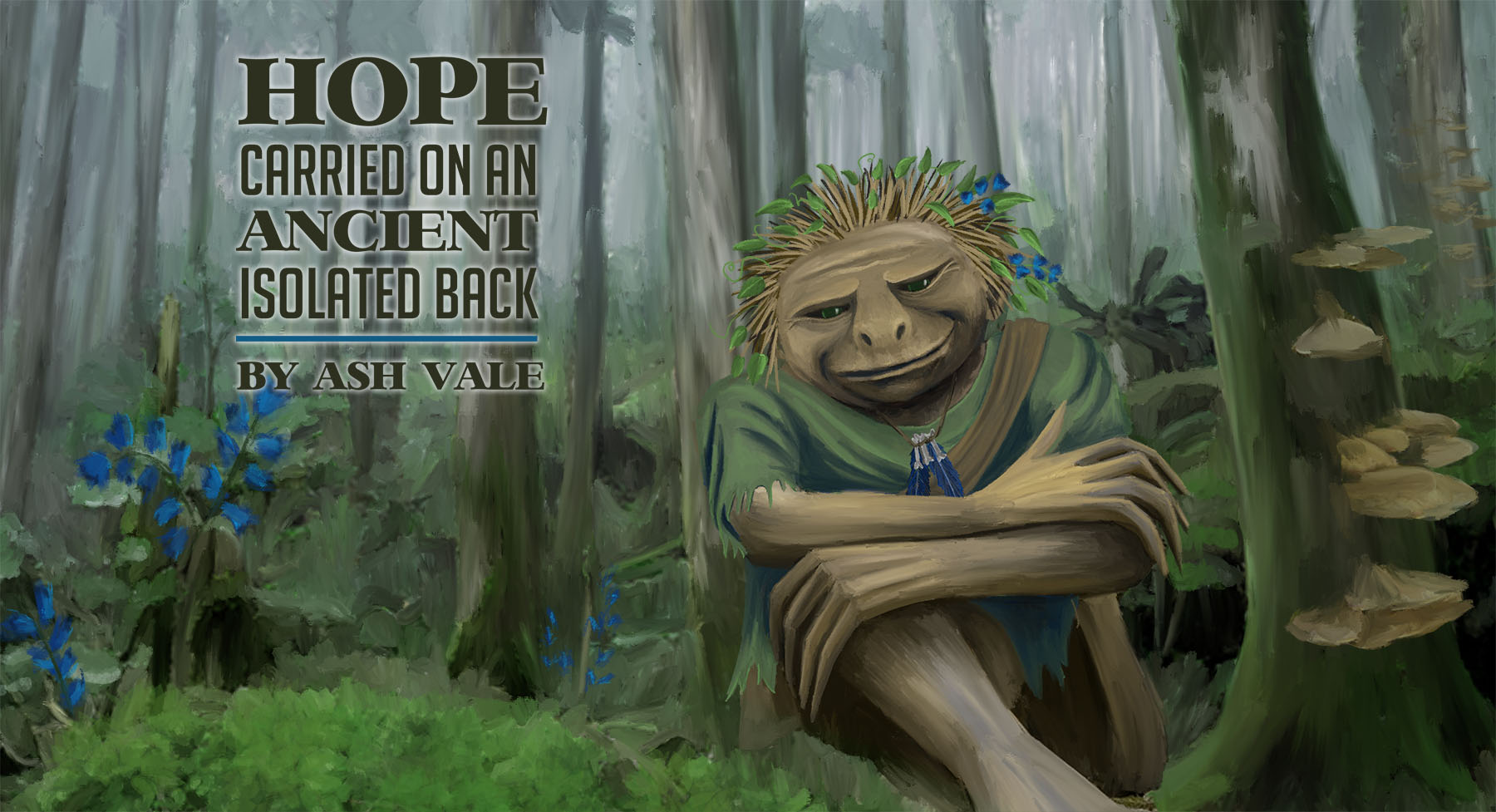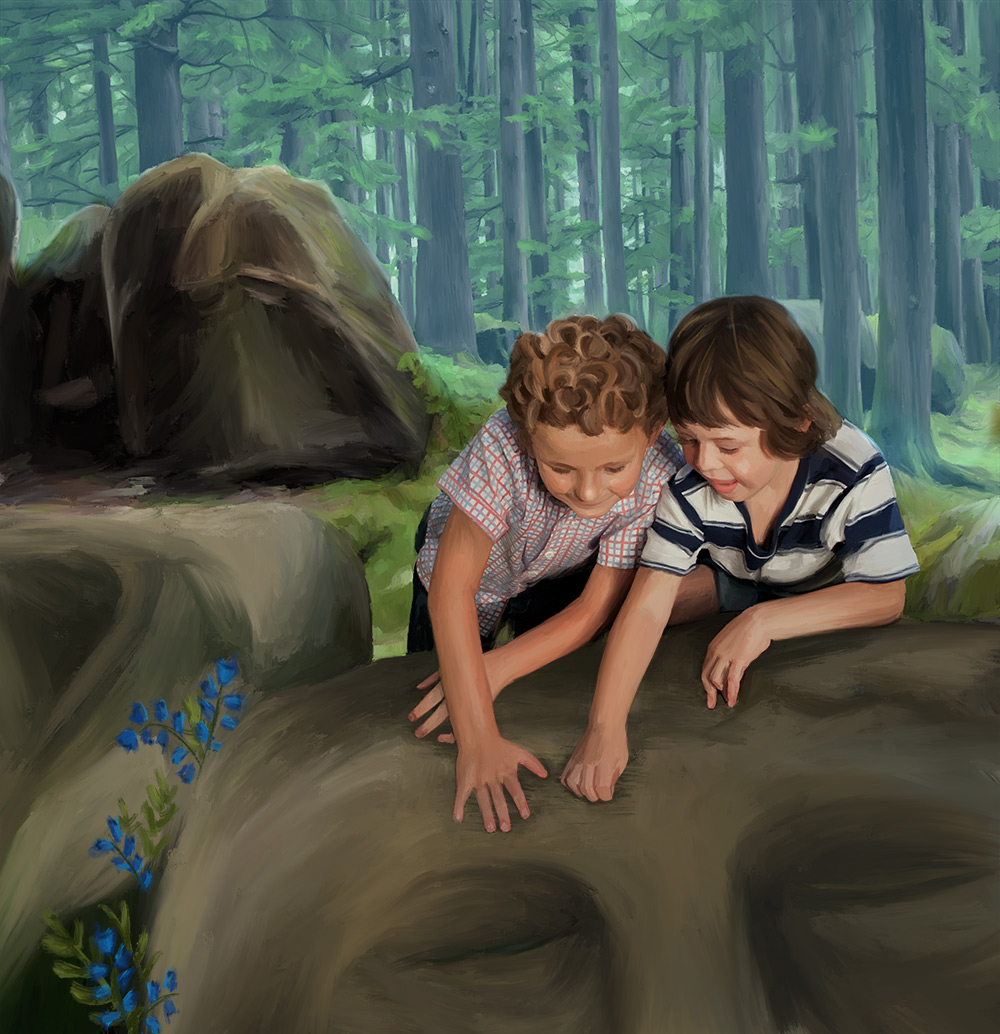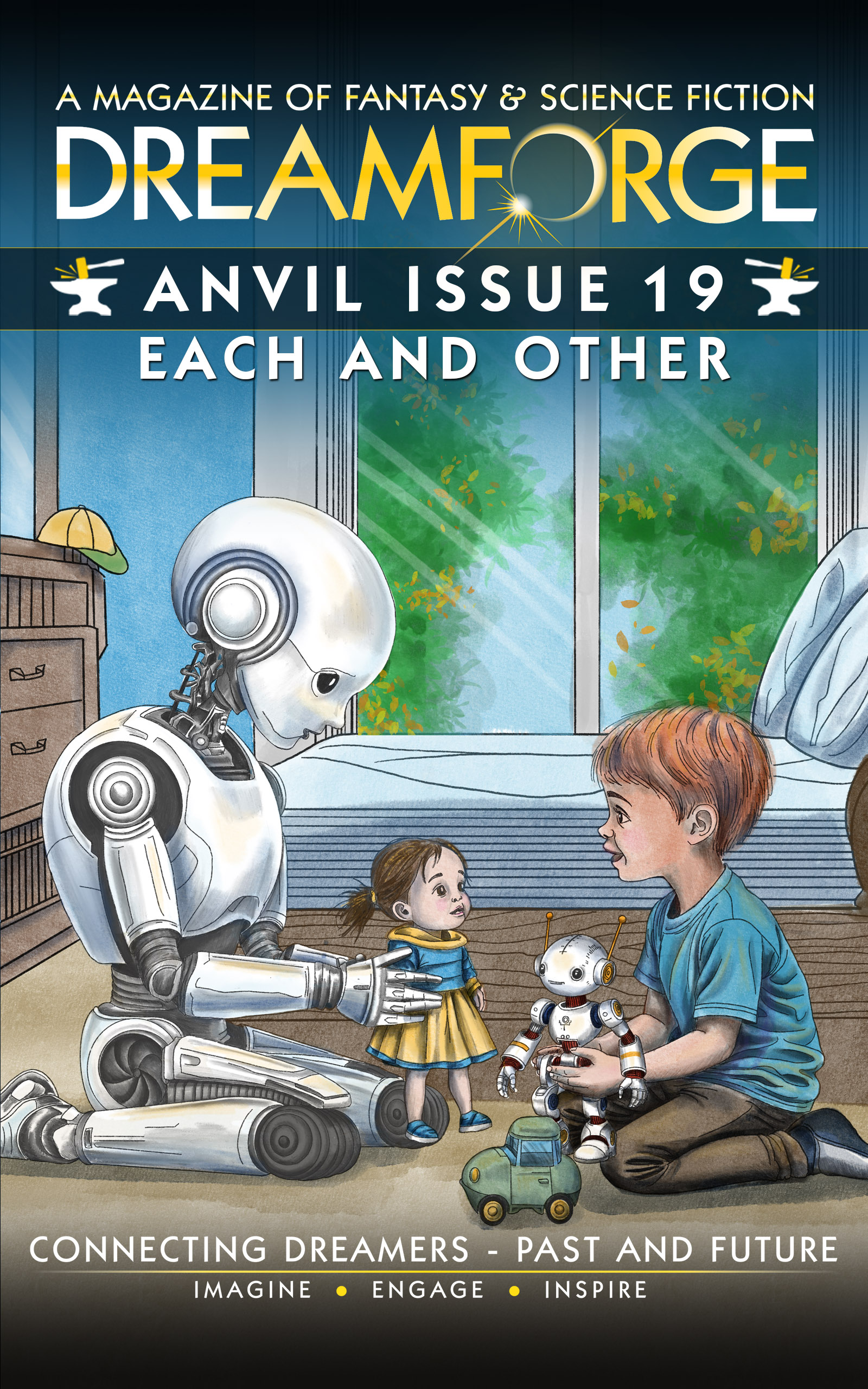 A pocket is no place for a skogstroll.
A pocket is no place for a skogstroll.
The boy who snatched my sleeping form from the forest floor and placed me here is young, sun-blonde, chubby-cheeked and afraid of aeroplanes. I do not know what an aeroplane is, but I can hear his parents trying to reassure him in the helpless way that parents often do.
“It will be like the train! You can look out the window and see the clouds.”
He stomps tiny feet on linoleum floors, jostling my body hidden in his shirt.
“I do not want to see the clouds! I want to stay here! I want to stay with mormor and morfar and our house!”
I am weightless, suddenly, lifted into the air along with the boy as he is picked up and ushered along. His parents’ words are muffled through the fabric.
“I know, sweet boy, but we are going. There is opportunity in Canada! And you will like the mountains, and the ocean, and the great wide fields—”
The boy’s wriggling and whines suggest that this line of logic is not persuasive enough. I cannot bite him, small as I am at this moment. I am terribly sleepy, however, so I accept my fate and return to my slumber. At least it is dark.
We arrive once more on solid ground. The trees here are not so different from what I am used to, but the smell is strange and the insects unfamiliar. The boy waits until we are alone in the dusk, then rushes out to the woods behind his new house and releases me, unceremoniously, from his pocket. I become large and fearsome; my limbs are long and willowed, my trunk stout and thick with branches. He should be afraid of me, I imagine, having grown up with tales of trolls and their appetite for children. I grin wide and sharp-toothed, my eyes round and luminescent in the waning light, and yet—he is not afraid. There are tears spilling over dirty cheeks as he stares at the ground, small feet kicking at pinecones and moss. I sigh. Emotions are not the domain of a skogstroll.
“Hva er i veien?” (What is wrong?)
His sniffles are abrupt in the stillness of the trees.
“I don’t like it here. I want to go home.”
He plunks down in the long grass, small body overcome by feelings and the tiring nature of travel. I join him on the ground slowly. My stubby, gnarled fingers tap gently on his back in as much comfort as I am able to provide. He rests his head on my prickly, pine needle shoulder.
That night, after the boy goes to bed, I search for other skogstroll, or elvetroll, or even a fjordtroll, though there are no fjords here that I have seen. I shout into the nearby well to try and wake a grizzly brønntroll, wondering perhaps if he has fallen asleep during his watch, but I find nothing. Trolls are solitary by nature, but to be entirely alone, with none of my kin around, is a shock to me. I curse the boy a little, though I suppose I understand him more now. I too wish to go home.
The dawn brings with it dappled sunlight through trees not my own, and a groaning unrest to my bones. I look around and make my decision: I will simply walk home. It may take a few days, but I do not wish to remain here. Foolish human and his foolish pocket.
So I begin to walk, away from this house and the boy, in the night, my steps long and lumbering and hopefully bringing me where I want to go.
As I walk, I grow larger and larger, willing my strides to carry me further and far from this place. I become as large as the mountains I approach, and I turn my creaking head to admire their strength and use a skogstroll’s sight to glimpse what lies beyond. I am stretched near to the limits of my abilities at this size, but my gaze drifts South and West beyond the impressive lines of the mountains. The earth trembles beneath my footsteps, like thunder in the darkness. What I find, to my crushing dismay, is endless rippling water, extending further than even my eyes can see.
A skogstroll might cross a river, or a creek, or dabble in a lake if one has stepped in something unsavoury, but never has one crossed such a mighty body of water and survived to tell the tale.
I spend many days and nights in fury and use my mountain toes to test the depths of the water, but what I know holds true: it is too wide and too deep for the likes of me.
My eyes sting as I consider once more the sight before me, and the truth of it rattles my bones.
I cannot return.
After several days of feeling sorry for myself, I go back to the house and the boy. I hide at first, stay small and out of sight, but he looks for me through the window and calls for me in the rain, and if he is brave enough to have brought me here, then he is brave enough to come along with me into the trees.
The boy talks to me often, as one might a friend, I assume. I have never had a friend. He is no use at imitating birdsong, and his hairless legs hold no sprouts, but a boy is better company than no company at all. He returns from wherever he goes during the day to sit with me by the shaded creek. I avoid the sunlight, for it bites at my weathered cheeks; all trolls know the moon and stars are made for us, the sun our bane. It is the way of things.
If I must be here, which appears to be the case, then I must nurture my surroundings and make the best of it that I can.
We craft small boats out of fallen twigs and branches he finds, set them sailing down the water’s path toward other homes, perhaps other children. Sometimes he sits and plays the accordion for me. I dance slow, stumbling polkas to make him laugh. He tells me about the engelsk he is learning: how his mamma reads him crossword puzzles in her strong accent, how his pappa brings him books from the library.
“They are trying so hard to leave Norge behind,” he says, “but I will not forget home. I will not forget you.” It is a nice sentiment, I think. I do not know how long it will hold.
He finds me many rainy afternoons in the dense trees behind the house. He has learned by now to approach me in twilight and shadows, or in the ready shade of storm clouds. I am occupied today with troll business: sitting, and pondering, and frightening humans. He is always eager to interrupt.
“They aren’t nice!” he tells me, his rage small and hot. I listen for the songs of chickadees, but they are silent, observing this unusual interaction between troll and boy.
“De andra barna?” (The other children?)
“Yes, the other children. They make fun of me, of my accent. They mock me reading out loud in class and tell me to say silly words so they can repeat them and laugh!” He kicks a rock away. I hum my disapproval, at the mistreatment of both the rock and the boy.
“Spiste du dem?” (Did you eat them?)
He looks at me sideways and giggles, his fury dampened by my ignorance. “No! I can’t eat the other children. Why do you always suggest that?”
I shrug my evergreen shoulders, lifting the tiny saplings that grow around my ears. Eating is the solution to most of my problems. Would that the boy’s problems were so simple.
One afternoon in the shade, the boy, growing all the time, looks at me, careful and considering, and asks if I should like to go home one day. I rumble as recall my early days here, the slow burn of anger through my roots that felt like it would swallow me whole. When I reach down through my toes now, I feel none of it residing there any longer. This is my home now, I think, and I tell him so. The boy seems mollified by this response and smiles at me, then throws mud at my head. Not so grown, yet.
The boy is occupied more and more these days with the sorts of things humans occupy themselves with, things of no interest to me in my woods. He tells me about his new, human friends, how they play fotball (though they call it something strange), eat sandwiches with bread on either side of the filling, and wrinkle their noses at the pickled fish his mamma sends him to eat. They do not need to hide from the day amidst brambles and ground cover. He does not play the accordion for me anymore, or at all; he has a guitar that holds no polkas, no valser. It is easier to carry, he says.
When he does come to see me, his norsk is halting and muddy, his apologies hollow like the rotting trees even my careful tending cannot save. I cannot afford to be upset with him, alone as I am. I do still enjoy his dwindling visits. This is the way of things, I suppose, that boys should change, and skogstroll should remain much the same.
I have not seen the boy in some weeks, now. Perhaps longer. My sense of time is careless at best. I have been hard at work luring goats from a nearby farm closer and closer to their fence so that I may eat them. It is a tricky endeavour, convincing a goat to do anything he does not want to do.
Voices catch on the wind, carried on invisible currents to my timeworn ears. The words are unintelligible from this distance, but the tone is noisy and sharp. I approach steadily, prepared to unnerve this interloper who thinks to trudge recklessly through my woods, to ruin my afternoon of earnest goat herding. Instead of an intruder, however, I find the boy. He has brought with him a girl his same size, the two laughing and crashing rudely through my new seedlings at the edge of the woodland. I stop my slow progress and watch them. Why would the boy bring another human here, to my humble dominion?
Their words resolve now, near enough as they are. The girl speaks.
“Canadians have imaginary friends too, you know? We just don’t keep talking about them like we’re babies.”
The boy huffs. “I’m Canadian, too, and I’m not a baby! You’ll believe it when you see it, and then you’ll feel like such a fool! He hangs out in these woods waiting for me. It’s not like he has anything else to do. You’ll see.”
Ah. So I am meant to be a trophy, a prize for whatever bidder might offer the boy their closeness. A skogstroll is not arrogant, but neither am I a pet, longing for domestication and a bed by the hearth. I turn into a tree.
The boy searches and searches, calling for me. The girl’s laughter, once a boon to the boy’s ego, now becomes a sharp-tipped spear, perfectly aimed. His casual confidence dissolves and his words become embarrassed, contrite. They eventually abandon their forage. They return to the house, the boy slumped and shamefaced in a way I have never seen. I do not feel badly for the boy— he has learned a valuable lesson about a skogstroll’s pride.
He will return to seek me out when he is alone again, I am certain, and we will speak of reparation. A human’s dignity is only ever briefly damaged, easily fixed. I remain as close to the house as I dare, afraid of what the dappled sunlight might do to my knotted body, but the boy stays away. I wait. My goats will keep as I hold vigil.
One morning, in the midst of my waiting, a large vehicle pulls in front of the house. I have been watching from the shadows of trees and rocks for days as the humans scurried around, moving things to and fro, frantic and loud. The boy is all lean, awkward limbs these days. His hair is darker and shorter. I have not seen him since the day of my trick. One has no need for a skogstroll, or for the norsk he trades in, when one is eager to leave fairytales and history and dissimilitude in the dust of their childhood. Many possessions are piled into the vehicle as I observe, slow-limbed and camouflaged. Finally, the humans join their belongings, and the vehicle departs. I raise my boughed arm in an unhurried wave, but it is not returned.
I watch, day after day, for the vehicle. I occupy myself with my woods: planting, tasting, nurturing. It is difficult not to wonder about the boy, despite all that there is to do. I am accustomed to the remote nature of my existence, but I am not prepared for loneliness.
A distasteful man comes and drives a sign into the unnatural grasses out front. His work appears to herald welcome to other humans, as shortly after his visit, more of them arrive. They speak only the common tongue here, foreign to me. They bring no children; no one for me to frighten, no one for me to eat. They have a large orange housecat who is tempting, but he is quick and hot-tempered, which he demonstrates with glee as he swats my large nose. Much to my dismay, they all remain in the house.
Their presence encourages me deeper into my realm. I am hopeful that the boy will return, to oust these intruders, to visit me again, even with his broken norsk; but hope carried on an ancient, isolated back can only travel so far.
Eventually, after many years alone, I brave the sunlight. I chance it in little glimpses to see if my kinsmen were correct in their warnings. It is warm and inviting, though it does make my bones creak, my joints ache. Over time, my mouth, void of speech for years, no longer sees fit to open at all. The cracks on my dry lips are permanent, the hair on my head wiry and moss-like. The saplings I’ve nurtured grow tall and strong throughout me. My body, unmoving now for so long, sinks slowly into the ground and gravel. My face is the only part of me still visible, though only to those who might think to look for it. People pass very rarely, but no one speaks the words I know; no one here knows of the trolls. I watch the world from my stony repose.

There are footsteps nearby this morning, more dissonant than the pitter-patter of squirrels and blue jays I have become accustomed to: one set heavy and purposeful and many others light and distracted. To my great surprise, the boy emerges from between the trees, except that he is a boy no longer. He is grown, now, and with him are two small children, fair-haired and freckled as he once was. His eyes are wide and nervous as he approaches. He kneels before me in the dirt, gently knocking small pebbles and rotting leaves from my head. I am grateful, both for the company and the care.
He speaks to the children in engelsk, in this tongue I have never been able to grasp, and they smile and pat me with soft hands. I wish that I could smile back. He encourages one of them forward to speak to me, and sunshine breaks through the trees and into my heart; for the language is soft and strangely accented, but it is familiar.
“Hei, hei! Hyggelig å møte deg.” (It is nice to meet you.)
Perhaps, I think, rivulets forming waterfalls from my frozen eyes, with my language in the mouths of children, I am not so alone here after all.












